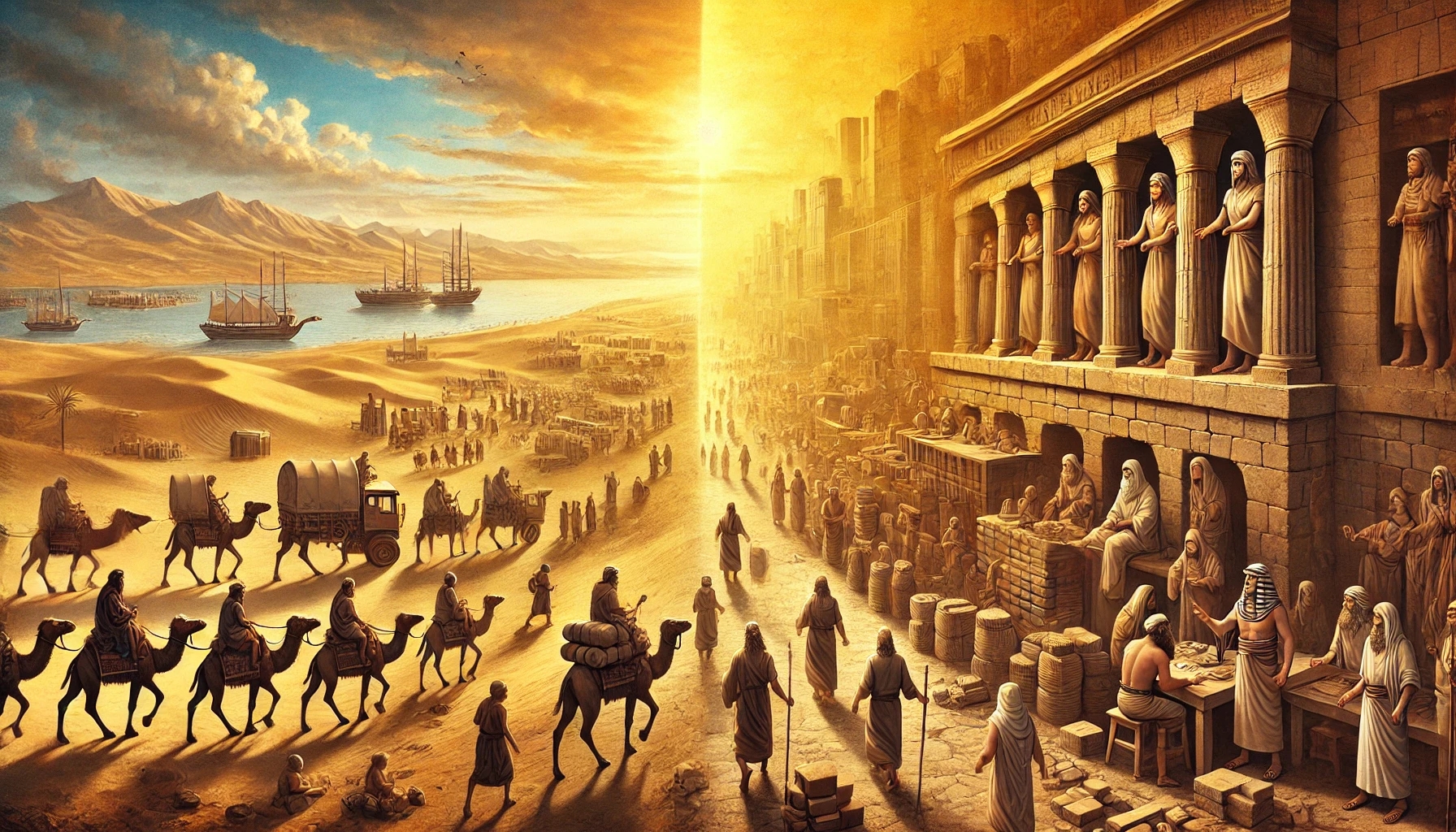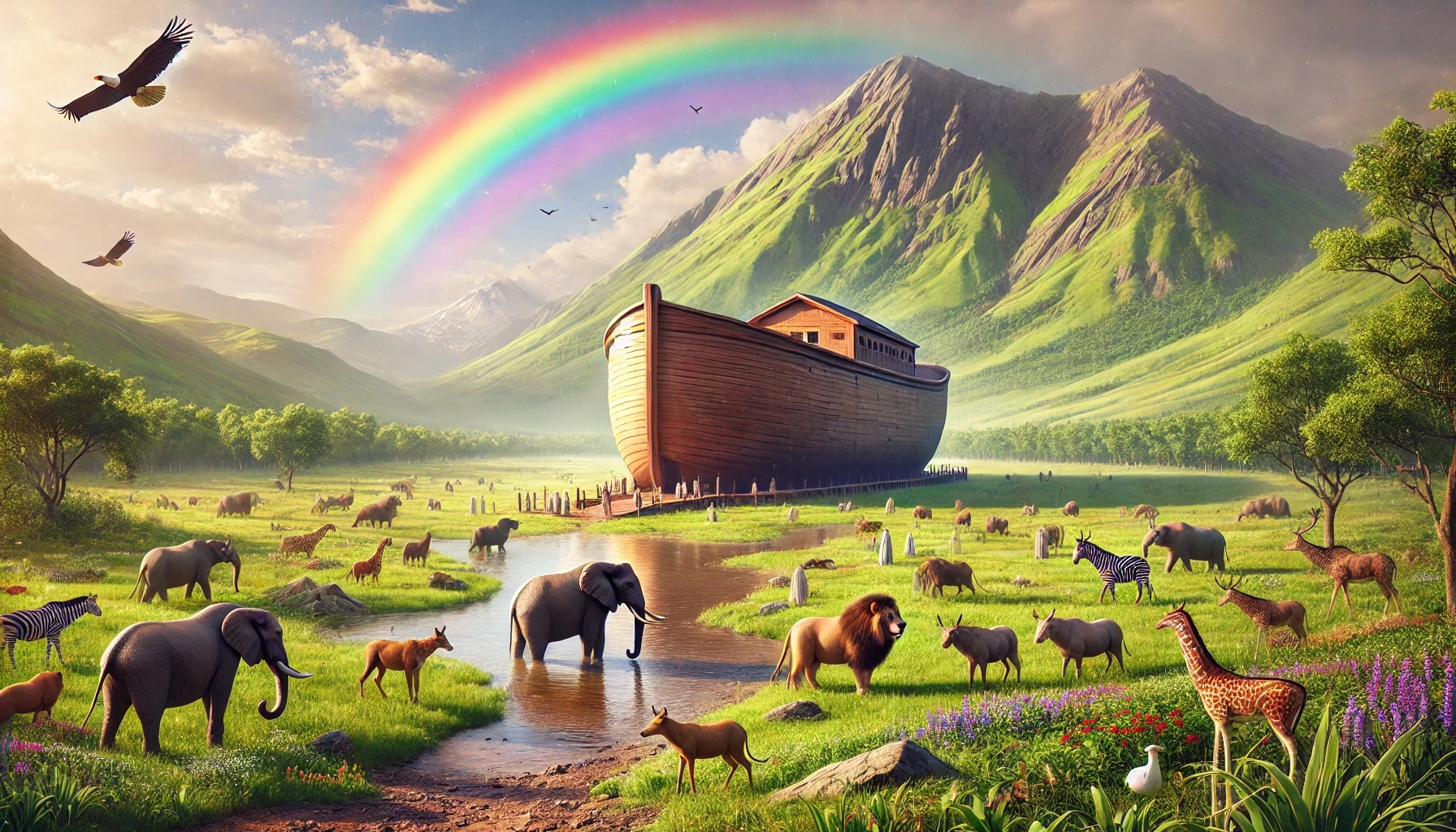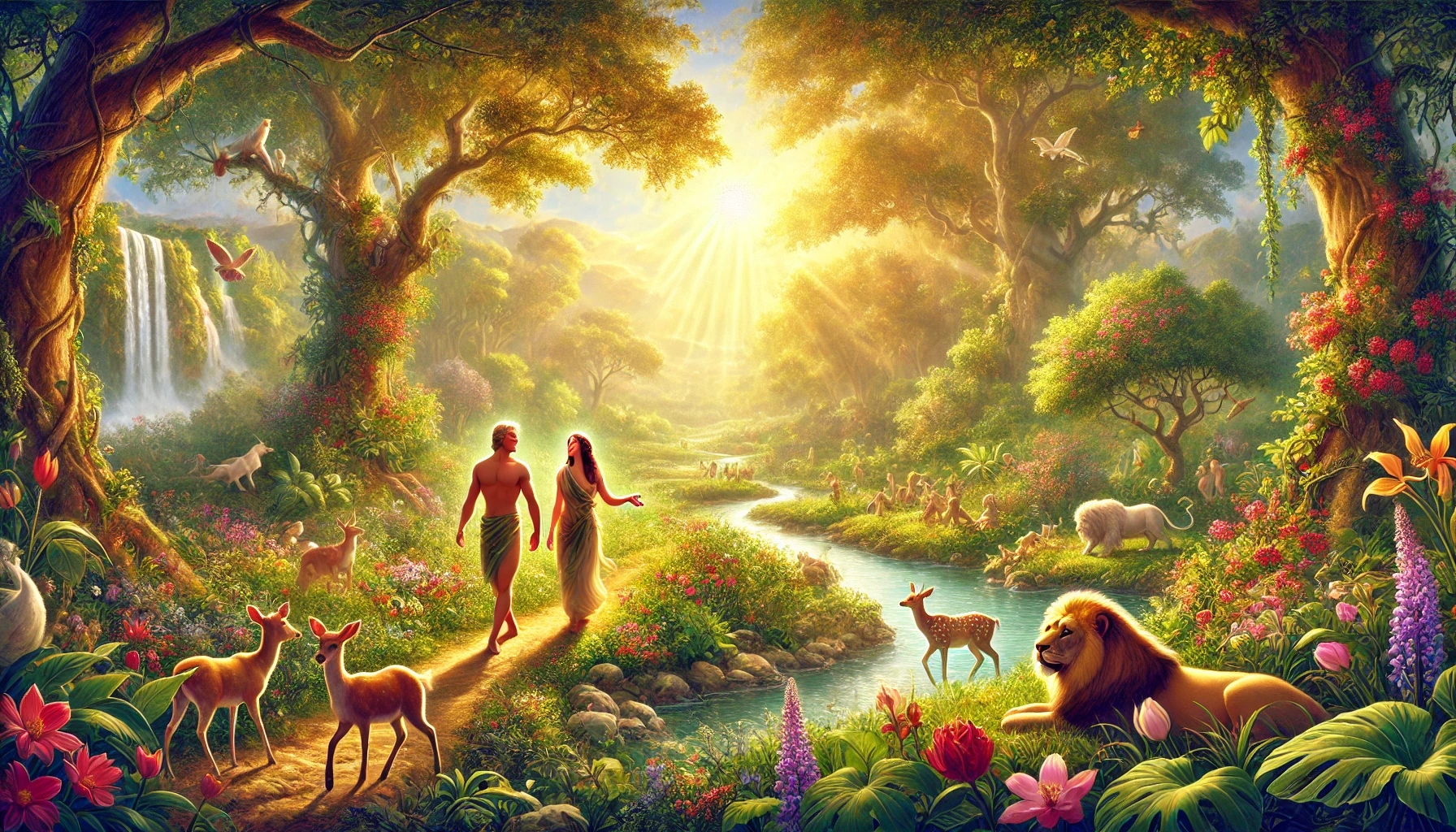
📖 The Message of Exodus
The message of the biblical book of Exodus is powerful, profound, and central to the understanding of the Old Testament. It can be divided into three main themes:
══════════════════════════════════════════════
🕊 1. Deliverance from Slavery – God Rescues His People
At the heart of Exodus is the story of Israel’s deliverance from Egyptian slavery. God hears the cries of His people (Exodus 2:23–25) and acts with power and mercy. Through Moses as His instrument, He leads His people out of oppression—with ten plagues, the Passover, and the crossing of the Red Sea.
▶ Central Message:
God is a saving God. He delivers people from bondage—then as now.
══════════════════════════════════════════════
📜 2. Covenant and Law – God Reveals His Will
At Mount Sinai, God reveals Himself to His people and makes a covenant with them. The Ten Commandments (Exodus 20) lie at the center of this covenant. They show how life with God and with one another is to be lived.
▶ Central Message:
God is not only a Savior but also a Lawgiver. Those who are freed do not live aimlessly—but according to divine principles.
══════════════════════════════════════════════
🏕 3. God’s Presence Among His People
In the second part of the book, God gives instructions for the Tabernacle—the Tent of Meeting. It is meant to be a visible sign that God dwells in the midst of His people (Exodus 25:8). The many details for its construction reveal how holy, accessible, and faithful God is.
▶ Central Message:
God is not a distant God. He dwells among His people and desires a relationship.
══════════════════════════════════════════════
✨ Summary of the Message of Exodus:
God delivers – God leads – God dwells with His people.
He is faithful, just, mighty, and full of grace.
The Exodus is not only a historical event but also a spiritual pattern for the life of every believer: from the slavery of sin into freedom with God.
~~~~~⛺~~~~~
📅 June 6, 2025
📖 DAILY BIBLE READING
✨ Exodus 1 – God’s People Under Pressure – Yet Unstoppable
⛺ How God Remains Faithful Amid Oppression and Causes His People to Grow
══════════════════════════════════════════════
📜 Bible Text – Exodus 1 (KJV)
1 Now these are the names of the children of Israel, which came into Egypt; every man and his household came with Jacob.
2 Reuben, Simeon, Levi, and Judah,
3 Issachar, Zebulun, and Benjamin,
4 Dan, and Naphtali, Gad, and Asher.
5 And all the souls that came out of the loins of Jacob were seventy souls: for Joseph was in Egypt already.
6 And Joseph died, and all his brethren, and all that generation.
7 And the children of Israel were fruitful, and increased abundantly, and multiplied, and waxed exceeding mighty; and the land was filled with them.
8 Now there arose up a new king over Egypt, which knew not Joseph.
9 And he said unto his people, Behold, the people of the children of Israel are more and mightier than we:
10 Come on, let us deal wisely with them; lest they multiply, and it come to pass, that, when there falleth out any war, they join also unto our enemies, and fight against us, and so get them up out of the land.
11 Therefore they did set over them taskmasters to afflict them with their burdens. And they built for Pharaoh treasure cities, Pithom and Raamses.
12 But the more they afflicted them, the more they multiplied and grew. And they were grieved because of the children of Israel.
13 And the Egyptians made the children of Israel to serve with rigour:
14 And they made their lives bitter with hard bondage, in morter, and in brick, and in all manner of service in the field: all their service, wherein they made them serve, was with rigour.
15 And the king of Egypt spake to the Hebrew midwives, of which the name of the one was Shiphrah, and the name of the other Puah:
16 And he said, When ye do the office of a midwife to the Hebrew women, and see them upon the stools; if it be a son, then ye shall kill him: but if it be a daughter, then she shall live.
17 But the midwives feared God, and did not as the king of Egypt commanded them, but saved the men children alive.
18 And the king of Egypt called for the midwives, and said unto them, Why have ye done this thing, and have saved the men children alive?
19 And the midwives said unto Pharaoh, Because the Hebrew women are not as the Egyptian women; for they are lively, and are delivered ere the midwives come in unto them.
20 Therefore God dealt well with the midwives: and the people multiplied, and waxed very mighty.
21 And it came to pass, because the midwives feared God, that he made them houses.
22 And Pharaoh charged all his people, saying, Every son that is born ye shall cast into the river, and every daughter ye shall save alive.
══════════════════════════════════════════════
🔵 Introduction
The story of the people of Israel in Egypt does not begin with freedom or departure—but with hardship. The God who promised Abraham a great offspring in Genesis seems to be hidden in the shadows while a new Pharaoh rules with violence and fear.
Yet Exodus 1 shows: God’s plans cannot be thwarted—even by human power or political systems. This chapter is not only a historical introduction but also a powerful picture of how God acts even in the darkest times.
══════════════════════════════════════════════
🟡 Commentary
-
Names, Origins, and Continuity (vv. 1–5)
“These are the names…”
The opening verses bridge back to Genesis: Jacob and his sons, the patriarchs of Israel, have come to Egypt. This list reminds us of God’s faithfulness—He has not forgotten their story.
-
Blessing Amid Foreignness (vv. 6–7)
“The Israelites flourished… and the land was filled with them.”
Despite being in a foreign land and facing seeming invisibility of God, the people grow. Here God’s promise to Abraham (Genesis 12) is fulfilled: “I will make of you a great nation.” Their increase is a blessing for the world.
-
New Power, New Threat (vv. 8–10)
“A new king…who did not know Joseph.”
Political amnesia changes everything. Suspicion becomes strategy: Pharaoh no longer sees the Israelites as guests but as a threat. Fear leads to oppression—a dynamic we still recognize today.
-
Systematic Oppression (vv. 11–14)
“They set taskmasters over them to thrust them into forced labor.”
What begins as political concern becomes structural violence. The Israelites are reduced to slave labor, their freedom and dignity systematically destroyed. Yet:
“The more they were oppressed, the more they multiplied.”
God’s promise proves stronger than Egypt’s schemes.
-
The Courage of the Midwives (vv. 15–21)
“But the midwives feared God and did not do as the king of Egypt commanded them; they let the boys live.”
Two ordinary women—Shiphrah and Puah—defy the orders of the world’s most powerful man. Why? Because they fear God more than people. Their civil disobedience preserves life—and God blesses them for it.
-
Brutal Escalation (v. 22)
“Then Pharaoh commanded all his people, ‘Every son who is born you shall cast into the Nile, but you shall let every daughter live.’”
When subtlety fails, Pharaoh resorts to outright violence. This final verse is grim—but it sets the stage for God’s intervention in the next chapter. When human control collapses, God’s plan becomes visible.
══════════════════════════════════════════════
🟢 Summary
Exodus 1 portrays the shift from blessing to slavery—and how God’s people are oppressed yet continue to grow. Pharaoh fears Israel and tries to subjugate them by force. But God works behind the scenes: through the people’s growth, through the courage of simple women, through quiet faithfulness. Humans may try to stop what God has begun—but they cannot succeed.
══════════════════════════════════════════════
🔴 Message for Us Today
God’s promises hold true even in hard times. If you feel under pressure, remember: God is present—even when things feel darkest.
Growth often happens amid hardship. Precisely in difficult seasons, your faith can deepen. Resistance builds character.
Courage begins in small acts. Shiphrah and Puah were not prophets or queens—they were simply faithful women who feared God. And God uses ordinary people to preserve life.
Civil disobedience can be godly. When what is demanded of you contradicts God’s Word, you must say “No.” Fear God above all people.
God’s story continues. Even though chapter 1 ends in darkness, deliverance soon begins. God’s plans do not end in suffering—they often unfold right there.
~~~~~⛺~~~~~

📆 June 1 – 7, 2025
📆 WEEKLY SPIRIT OF PROPHECY READING
📖 Ellen G. White │ Patriarchs and Prophets – Chapter 8
✨ After the Flood
📖 Read online here
══════════════════════════════════════════════
🔵 Introduction
The flood was over. The waters receded, and the ark came to rest. But life after the flood was not simply a continuation—it was a complete new beginning. In Chapter 8 of Patriarchs and Prophets, we read how God not only saves but also leads, protects, and grants new promises. Noah, the faithful preacher of righteousness, stands as a shining example of obedience, gratitude, and trust—even in times of deep uncertainty. The world that awaited him was no longer the same—but God had not changed: faithful, powerful, and full of grace.
══════════════════════════════════════════════
🟡 Commentary
1. Faith in the Test (The Months in the Ark)
The five months spent in the ark were a hard trial of patience. Without knowing when the waters would recede, Noah remained steadfast. He did not doubt God’s leading. Faith carried him and his family through the darkness.
Lesson: True trust is shown in the silence of waiting. God’s hand guides even when we cannot see it.
2. The Ordered Return (The Birds and Patience)
Noah sent out the raven and the dove in search of a sign. But he did not act impatiently—he left the ark only when God explicitly commanded him.
Lesson: Even when we see signs, our decisions must be guided by God’s word, not by circumstances alone.
3. The First Altar (Gratitude and Sacrifice)
Before he built a home for himself, Noah built an altar for God. He offered clean animals—an expression of his faith in the coming sacrifice of Christ.
Lesson: True gratitude first honors the One who gave everything—even when our own resources are scarce.
4. God’s Response: The New Covenant
God smelled the “pleasing aroma” of the sacrifice and declared a new covenant: there would be no more global flood. The rainbow became the sign of this covenant.
Lesson: God uses visible signs to assure us of His invisible faithfulness. His promises are for all generations.
5. A Changed Earth, A Changed Lifestyle
The earth was completely altered—landscape and ecosystem. God permitted the eating of meat as an adaptation to the new reality.
Lesson: God’s care and instructions adapt to human situations, but His moral will remains unchanged.
6. Hidden Treasures and Judgment
The flood buried not only bodies but also human pride, wealth, and idolatry. From this came coal, oil, and ore—evidence of God’s judgment but also of His mercy.
Lesson: What man abused, God transformed into a testimony of His power and justice.
7. Future Judgments: Fire Instead of Water
As water once cleansed the earth, so fire will purify it at the end. Volcanoes, earthquakes, and disasters are forerunners of Christ’s return.
Lesson: God’s warnings are not meant to frighten but to call us to repentance—His grace protects His people.
8. God’s Protection for His Own
Just as Noah was safe in the ark, God’s people will be protected by His power at the end. Psalm 91 becomes a personal promise amid chaos.
Lesson: The safe place is not geographical, but spiritual—under God’s wings.
══════════════════════════════════════════════
🟢 Summary
After the flood, Noah stepped into a radically changed world. But in the midst of death and destruction, his heart remained focused on God. His obedience, gratitude, and faith make him a model for all generations. And God responded with grace, promise, and protection. The rainbow stretching across the sky and throne remains the eternal sign: God’s covenant stands. And though future judgments will come, He will preserve those who trust in Him.
══════════════════════════════════════════════
🔴 Message for Us Today
In a world again marked by uncertainty, disasters, and moral decay, God calls us to live like Noah: with faith, obedience, and gratitude. When all that we know is shaken, we can rest assured:
God’s hand is still at the helm.
His covenant still stands. The rainbow in the sky is more than a natural phenomenon—it is a testimony of His faithfulness. And just as Noah was preserved in the midst of judgment, so we too can know:
The righteous are safe—not because they are strong, but because they trust in God.
So then, let us build altars of gratitude before we build houses. Let us give before we take. Let us believe before we see.
For the Lord, your Redeemer, says:
“My kindness shall not depart from you.” (Isaiah 54:10)
~~~~~⛺~~~~~

📆 June 1 – 7, 2025
📆 WEEKLY SPIRIT OF PROPHECY READING
📖 Ellen G. White │ Patriarchs and Prophets – Chapter 9
✨The Literal Week
📖 Read online here
══════════════════════════════════════════════
🔵 Introduction
The division of the week into seven days goes directly back to Creation: six days of work and one day of rest. In Chapter 9 of Patriarchs and Prophets, Ellen G. White explains how this divine principle was established in the Creation narrative and reaffirmed in the Law at Sinai. At the same time, she warns against modern misconceptions that stretch the Creation week into indefinite periods and thereby undermine the Fourth Commandment.
🟡 Commentary
1. Biblical Foundation of the Seven-Day Week
1.1 Creation Days as Literal Days
-
- Each Creation day consisted of an evening and a morning and was no different from our present days.
- God created for six days; on the seventh He rested, blessed, and sanctified that day as the Sabbath.
1.2 Confirmation at Sinai
-
- The Fourth Commandment refers directly to God’s own work of Creation (Exodus 20:8–11).
- This clear rationale underscores the literal meaning of a seven-day week.
2. Critique of Unbiblical Time Interpretations
2.1 Geological Theories vs. the Creation Account
-
- Geologists find fossil remains of large creatures and often interpret them as evidence for long ages of Earth’s history.
- White argues that many discoveries are remains of pre-Flood beings and do not contradict the biblical week.
2.2 Error and Unbelief
-
- Expanding the Creation days into indeterminate ages obscures the clear command of God.
- Satan’s aim is to blur the Fourth Commandment and stir rebellion against divine authority.
3. Harmony of Science and Revelation
3.1 Limits of Human Science
-
- Natural science cannot fully explain God’s creative activity.
- True education and research lead not to doubt but to obedience to God’s Word.
3.2 The Book of Nature and the Written Word
-
- Both complement each other: discoveries in nature and in Scripture affirm God’s power.
- Science without a biblical foundation drifts “without chart or compass” on unknown seas.
🟢 Summary
Ellen G. White emphasizes that the seven-day week begins with literal days in Creation and is confirmed by the Law at Sinai. Modern geological theories that assign vast, undefined periods to the Creation days contradict the clear biblical account. Science and revelation do not conflict, provided research remains within the framework of Holy Scripture.
🔴 Message for Us Today
The Fourth Commandment reminds us of God’s authority as Creator and highlights the importance of regular rest. In an age when scientific theories often extend beyond the Bible, we should always measure our understanding against God’s Word. Observing the Sabbath can renew our strength and bolster our faith.




















